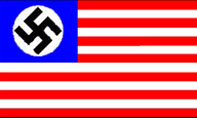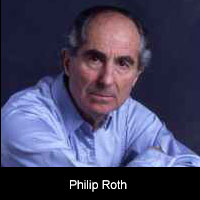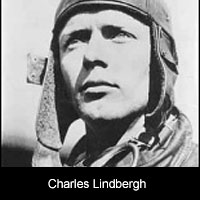- About Us
- Columns
- Letters
- Cartoons
- The Udder Limits
- Archives
- Ezy Reading Archive
- 2024 Cud Archives
- 2023 Cud Archives
- 2022 Cud Archives
- 2021 Cud Archives
- 2020 Cud Archives
- 2015-2019
- 2010-2014
- 2004-2009
 |
Literature Review: |
Philip Roth is a dominant figure in modern literature.
For what it is worth, he has won just about every prize available in the USA and when a recent debate arose as to whether the Booker Prize should be extended to all writers, and not just those operating in the : British Commonwealth:'' such as it is''one English writer worried out loud that this would mean just handing it to Philip Roth every year.
Such is his reputation among other scribes even 44 years after he won the National Book Award for his debut short novel, :Goodbye Columbus:. Few authors can refer to such a long period of dominance, and within the two dozen titles he has produced since then, there is a lot to make an aspiring writer weep with envy and a reader for leisure cry with laughter.
Roth's intimidation of other writers must at least partially flow from his purple  patch in the 1990's''the National Book Critics Circle Award (his second) for :Patrimony: in 1991, the National Book Award for the extraordinary :Sabbath's Theatre: in 1995, a Pulitzer for :American Pastoral: in 1997, and several coveted awards for :I Married a Communist: in 1998. The critical praise is of course coupled with tremendous sales. He can even look to a film version of :The Human Stain: (2000) starring our own Ms Kidman and Sir Anthony Hopkins: in fact a goodish film of a not'great book.
patch in the 1990's''the National Book Critics Circle Award (his second) for :Patrimony: in 1991, the National Book Award for the extraordinary :Sabbath's Theatre: in 1995, a Pulitzer for :American Pastoral: in 1997, and several coveted awards for :I Married a Communist: in 1998. The critical praise is of course coupled with tremendous sales. He can even look to a film version of :The Human Stain: (2000) starring our own Ms Kidman and Sir Anthony Hopkins: in fact a goodish film of a not'great book.
Roth's latest work is a piece of historical fiction titled :The Plot Against America:. Unusually the protagonist of the book is named Philip Roth, a young lad whose home life will be familiar to anyone who has read his various works of autobiographical fiction. From the legendary: :Portnoy's Complaint:. To the various Nathan Zuckerman novels: that of a Jewish boy in a lower middle class New Jersey home living both with American patriotism and the Jewish sense of difference.
(It should be noted that one does not need to be Jewish to enjoy Roth. This reviewer can vouch for that and indeed many Jews are more than unhappy with the image they feel he gives to his co'religionists, especially given the onanist fixations of Portnoy or the many sexual episodes related in Roth's books which sometimes, it has to be said, cross the line into the gratuitous.)
The historical speculation of Roth's novel is that the German'American aviator Charles Lindbergh gains nomination to the White House by the Republican party in the pivotal year of 1940. This of course is not good news for a young but hyper'alert Jewish boy as Washington lurches sharply away from London and drifts gradually towards sympathy with Berlin.
Roth's book sketches out the imagined actions of a cast of real life figures: Lindbergh, Franklin Roosevelt, Henry Ford, and Fiorello LaGuardia, as well as figures less well known in Australia such as press and radio figure Walter Winchell, and Catholic priest and broadcaster Charles Coughlin, both figures about whom the curious can and should learn a lot of with little effort via the world wide web.
Roth's imagination builds with some faithfulness on their actual deeds of the period and his endnotes contain potted biographies of these figures to assure the reader that his speculation, while just that, is not reckless.
In historical reality, Lindbergh's opposition to American involvement in the fight against Nazism was a matter of public record, and he attributed the pre'Pearl Harbour push for war to Roosevelt, to British agents, and to the Jewish influence in film and radio. (An oft overlooked historical fact is that the US did not ultimately declare war on Germany, but that Hitler 'a man who we can safely say was at times irrational' declared war on the USA a few days after Pearl Harbour despite having no treaty obligation to do so, making Lindbergh's position embarrassingly redundant. As a further aside, knowledge of Hitler's treaty obligations and for that matter his poor observance of them more than deflates the sinister idea that Roosevelt knew in advance of the Japanese ambush in Hawaii but kept mum in order to excuse America's entry into the war in Europe.)
The strength of any work of fiction, and perhaps more so in the case of historical fiction, is the degree to which the reader is led not to question the believability of the events portrayed. That people typically do not walk out of one of George Lucas or Steven Spielberg's fantasies contemptuously snorting :As if!: is a testament to their storytelling craft. Roth, by dealing with known people and observable facts, sets himself a credibility hurdle possibly higher than that required for one to digest interplanetary battles or alien houseguests.
Any reading of this book leads inevitably to the question: Is the case of a pro'Nazi White House believable under the unavoidable acid test of hindsight. Was such a scenario possible?
 A very scientific knowledge of American institutions might lead to a 'no' answer, but Roth understands the German'Jewish experience of the 1930's and the creeping nature of the tragedy. The passage of events brings to mind the fabled boiling frog: a frog dropped into hot water will immediately leap out of it, one placed in cold water which is brought to the boil never reacts and is of course ultimately cooked.
A very scientific knowledge of American institutions might lead to a 'no' answer, but Roth understands the German'Jewish experience of the 1930's and the creeping nature of the tragedy. The passage of events brings to mind the fabled boiling frog: a frog dropped into hot water will immediately leap out of it, one placed in cold water which is brought to the boil never reacts and is of course ultimately cooked.
Such was the gradual deterioration of the Jewish status in Europe, and Roth imagines it as happening in the USA.
The Weimar constitution, a relatively educated public, certainly more educated than Britain, and a centuries old Germanic intellectual tradition did not save Germany's Jews so why not speculate that similar conditions might not save Jewish Americans? Roth further harnesses such subtleties as the potential campaigning potency of air travel in a pre'television setting. Hitler was able to campaign and cajole several cities in a day by flying, as did Churchill up to a point, and Roth speculates as to how much more powerful the same method might be when the candidate is already famous as a daring aviator and doing his own flying!
Roth is surefooted when he imagines the dialogue of the American Jews who balance their assimilation and commitment to America with the threatening presence in the White House: his characters are stunned that people they know could even think of fleeing to Canada to avoid what the future might hold. We know that similar rhetoric abounded in Germany after 1933.
Roth constructs a series of events that are arguably plausible in the abstract; but this is not the same as saying that he successfully pulls it off in the concrete. It might be said that a 'highish' level of knowledge and interest in the politics of the period in question might lead to a higher threshold of credulousness which Roth probably fails to clear.
This though is not the only benchmark for the book. Judging it against his other works it does not fare well. While he has probably wisely left sex out of this novel he seems to have left comedy out of it as well. The blending of comedy and the Jewish Holocaust is perhaps Mel Brooks' cup of tea and no one else's, so the straightness of Roth's book is not a criticism as such. It is simply an observation that a normally key reason for reading Roth in the first place is not there in this instance. Comparing "The Plot Against America" to his other non'comic triumphs is perhaps more to the point, and again sadly this latest novel falls short.
:I Married a Communist: explores personal events in the context of an historical episode and is probably the closest in tone to this book but it is far superior. :The Human Stain: is not Roth's best but it is still very good: better than this one. :American Pastoral: is mostly without the sex and comedy of much of his work but it is still entirely engrossing, its characters perfectly drawn, expertly rounded and realised.
Roth's book is a disappointment only by his own standards. You will read praise for it elsewhere because the man's deserved reputation precedes him and American critics seem more prone to champion their own than to tear down a winner. The fact is that the writer is a gem, some say the best American writer since World War Two. If you have not read the sometimes infantile yet still perfect :Portnoy's Complaint: then you are wasting your life. Many more triumphs follow, especially in the last dozen years, but :The Plot Against America: is not quite one of them.
If World War Two 'what if?' books interest you, then you might well enjoy the deservedly popular thriller :Fatherland: by Robert Harris. If you seek a low farce book version of Woody Allen, then Roth has it elsewhere in spades.
This latest book remains worth a read for curious Roth aficionados and indeed as an excellent reminder of who was saying what in one of the more intoxicating periods of modern history.
:The Plot Against America: is a good book. But it is not one of the great Roths.
(Note that no plot has been revealed in this review which can not be gleaned in the first paragraph of this novel.)
